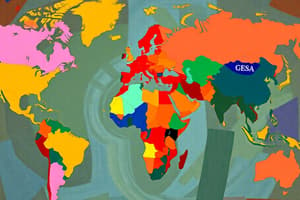Podcast
Questions and Answers
What is the primary objective of the European Union?
What is the primary objective of the European Union?
What is the significance of the EU's single market?
What is the significance of the EU's single market?
Which entity is the second-largest economy in the world?
Which entity is the second-largest economy in the world?
What is the main focus of the article 'Contemporary Centers of Power: A Global Perspective'?
What is the main focus of the article 'Contemporary Centers of Power: A Global Perspective'?
Signup and view all the answers
Which global entity has the power to authorize military intervention and impose sanctions on member states?
Which global entity has the power to authorize military intervention and impose sanctions on member states?
Signup and view all the answers
Which entity is a one-party state governed by the Communist Party?
Which entity is a one-party state governed by the Communist Party?
Signup and view all the answers
Which entity advocates for its interests and promotes its values, including democracy, human rights, and the rule of law?
Which entity advocates for its interests and promotes its values, including democracy, human rights, and the rule of law?
Signup and view all the answers
Which entity has established the Belt and Road Initiative aimed at enhancing regional connectivity and economic cooperation?
Which entity has established the Belt and Road Initiative aimed at enhancing regional connectivity and economic cooperation?
Signup and view all the answers
Which entity is a supranational political entity with its own institutions such as the European Parliament and the European Commission?
Which entity is a supranational political entity with its own institutions such as the European Parliament and the European Commission?
Signup and view all the answers
Which entity holds significant influence over economic, political, and diplomatic affairs, driving the course of international relations?
Which entity holds significant influence over economic, political, and diplomatic affairs, driving the course of international relations?
Signup and view all the answers
Study Notes
Contemporary Centers of Power: A Global Perspective
As the world evolves, so too do the centers of power that shape its course. Today, three primary entities hold significant influence over global affairs: the European Union, China, and the United Nations. These entities play crucial roles in shaping international policy, driving economic growth, and fostering diplomatic relations. This article delves into the contemporary centers of power, focusing on the European Union, China, and the United Nations.
European Union
The European Union (EU) is a political and economic union of 27 member states, located primarily in Europe. Established in 1993, the EU has expanded from its original core of six countries to include 27 members, with new members joining every decade. The EU's primary objectives are to promote peace, security, and stability among its members and to establish a single market for goods, services, and capital.
The EU's influence extends beyond its core member states, with its policies and initiatives shaping the wider European region and beyond. Key aspects of the EU's power include:
-
Economic Influence: The EU is the second-largest economy in the world, after the United States, with a GDP of $24.6 trillion. Its single market, the largest in the world, allows for the free movement of goods, services, capital, and people.
-
Political Influence: The EU operates as a supranational political entity, with its own institutions, such as the European Parliament and the European Commission, exercising significant power over its member states.
-
Diplomatic Influence: As a major global player, the EU engages in diplomacy with nations across the world, advocating for its interests and promoting its values, including democracy, human rights, and the rule of law.
China
China is the most populous country in the world, with over 1.4 billion people. It has experienced rapid economic growth over the past few decades, transforming itself from a primarily agrarian economy to a global superpower. Key aspects of China's power include:
-
Economic Influence: China is the world's second-largest economy, with a GDP of $16.2 trillion. It is also the world's largest exporter and second-largest importer.
-
Political Influence: China is a one-party state governed by the Communist Party of China. Its political system, known as socialism with Chinese characteristics, allows for a strong central government and limited political freedoms.
-
Diplomatic Influence: China is a permanent member of the United Nations Security Council and plays a significant role in global diplomacy. It has also established the Belt and Road Initiative, a massive infrastructure project aimed at enhancing regional connectivity and economic cooperation.
United Nations
The United Nations (UN) is an international organization founded in 1945 to promote peace, security, and cooperation among its member states. Key aspects of the UN's power include:
-
Economic Influence: The UN's role in promoting international development, humanitarian assistance, and disaster relief has a significant impact on the global economy.
-
Political Influence: The UN's General Assembly, with all 193 member states, serves as the main platform for international cooperation and multilateral diplomacy.
-
Diplomatic Influence: The UN's Security Council, with five permanent members and 10 non-permanent members, has the power to authorize military intervention and impose sanctions on member states that violate international law.
Conclusion
In conclusion, the European Union, China, and the United Nations are the contemporary centers of power that shape the global landscape. Each entity holds significant influence over economic, political, and diplomatic affairs, driving the course of international relations and shaping the future of our interconnected world.
Studying That Suits You
Use AI to generate personalized quizzes and flashcards to suit your learning preferences.
Description
Explore the contemporary centers of power that shape the global landscape, focusing on the European Union, China, and the United Nations. Delve into their economic, political, and diplomatic influence on international affairs.



